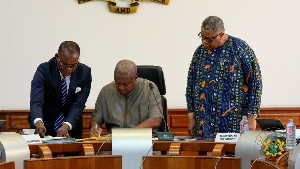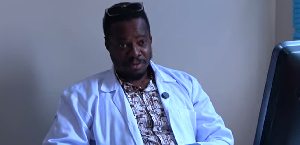Accra (Greater Accra), 17 March '99 -
The First Lady, Nana Konadu Agyeman Rawlings on Tuesday called on government to expedite action to finalise the national gender policy document. The document will give direction to efforts to put gender in the mainstream of national development, she said at the inauguration of the Gender Development Institute (IGD) in Accra. The Institute seeks to provide quality service by highlighting gender issues for equitable human development through education, training, information and advisory services. It has a six-member Advisory Committee, with Professor Miranda Greenstreet of the University of Ghana as Chairman and Mrs Lorraine Osei- Mensah, Co-ordinator of the Institute, as Secretary. Nana Konadu called for the strengthening of collaboration between government and Non-Governmental Organisations (NGOs) as well as civil society in reaching the goal since government alone cannot carry the entire burden. Nana Konadu said, through the commitment of institutions such as IGD, the new generation of women, would find it easier to occupy positions of prominence and influence in their organisations and communities. She said the task is, however, not easy due to current staggering statistics. More than half of women in Sub-Saharan Africa over 25 years are illiterate and are under represented in key decision-making positions and managerial levels of the economy such as the banks, foreign trade, industry, legislature and judicial systems. Nana Konadu said she was of the view that investing in women, apart from being fair, is essential to reducing poverty and promoting growth. She appealed for a change from the culture of "pulling down rather than strengthening," adding "let us learn to build on what we have - our strengths, institutions, natural resources, ideas, energies, technologies, structures and, most important of all, our human resources especially women and girls." Mr Kwabena Kyere, Deputy Minister of Education, who chaired the function, said there is a global effort to ensure that women are placed in their rightful positions in society. This has come from the "lessons we learn from our women who have distinguished themselves in responsible positions. "The efficiency and competence they display are a source of encouragement for us to do all we can to empower them". Mrs Elizabeth Akpalu, a Gender Consultant, gave a catalogue of disparities between men and women at all levels of the Ghanaian society and said, though the government has taken measures to improve upon the education of girls, gender inequality should be addressed at the national level. Mr Wibert Tengey, Chief Executive of the Institute, said it aims at assisting individuals, organisations and institutions with professional expertise through positive gender-sensitive programmes. This, he said, would be achieved through a range of high quality training and educational services and a database with experiences and strategies which would add value to efforts aimed at promoting gender- awareness programmes.
General News of Wednesday, 17 March 1999
Source: --












